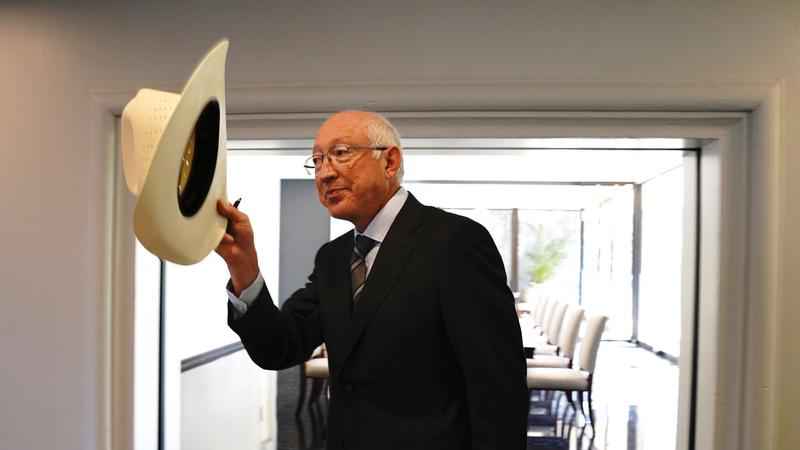US negotiating with Mexico to get visas for DEA agents

U.S. Ambassador to Mexico Ken Salazar bids farewell after speaking at the ambassador's residence in Mexico City, Tuesday, Nov. 9, 2021, about the discussions between the two nations on visas for United States DEA agents. and Mexico's controversial energy reform. Mexico has refused to grant more visas to US agents and has proposed limiting the amount of electricity it will buy from gas and renewable power plants operated abroad. AP Photo/Marco Ugarte [AP Photo/Marco Ugarte]
The U.S. ambassador to Mexico said Tuesday the two countries are negotiating to get Mexico to approve visas for agents of the U.S. Drug Enforcement Agency to work in Mexico.
Local media reported that Mexico basically stopped issuing visas for DEA agents after enacting a law that limited their operations in Mexico and removed their immunity.
U.S. Ambassador to Mexico Ken Salazar would not specify whether all DEA visas have been completely frozen, but did say the two countries are talking about the visa issue and are getting closer to a solution.
"We’re making progress on a whole host of fronts," Salazar said. "We now are doing it in a shared approach with the Mexican government."
"The visas are one example," Salazar said. "We are making good progress on that issue."
Salazar would not say what Mexico was demanding in return for issuing new visas, but some press reports indicate Mexico wants equal access to sensitive intelligence information for its agents in the United States.
That would be a troublesome demand, giving the Mexican government’s history of leaks of sensitive documents.
In January, Mexican President Andrés Manuel López Obrador published all of the information the U.S. had shared on former Mexican defense secretary Gen. Salvador Cienfuegos. U.S. prosecutors said he collaborated with a drug gang, but Mexico quickly cleared Cienfuegos of an wrongdoing, and revealed the contents of the entire U.S. investigation against him.
That spurred a rare public rebuke from the Justice Department, which said it was "deeply disappointed by Mexico’s decision to publicize information shared with Mexico in confidence."
"Publicizing such information violates the Treaty on Mutual Legal Assistance between Mexico and the United States, and calls into question whether the United States can continue to share information to support Mexico’s own criminal investigations," the department said at the time.
Salazar was also circumspect about another friction point with López Obrador’s administration, a controversial energy reform bill that would limit the amount of electricity the state-owned utility buys from foreign-built renewable and natural gas-fired power plants.
U.S. congressmen and energy companies have expressed their concern that Mexico is tearing up existing contracts in the sector, changing the rules under which investments were made in those plants and favoring the state-owned utility.
Salazar said of the companies, "of course they are concerned," noting the U.S. was also discussing the issue with Mexico.
Salazar said he was "optimistic" that a solution could be found on the issue, but later added "I am not sure."
In December, Mexico’s congress approved a law that requires all foreign agents, from any country, to share all information they gather with Mexican authorities. It also would require any Mexican officials they contact to submit a written report to federal authorities.